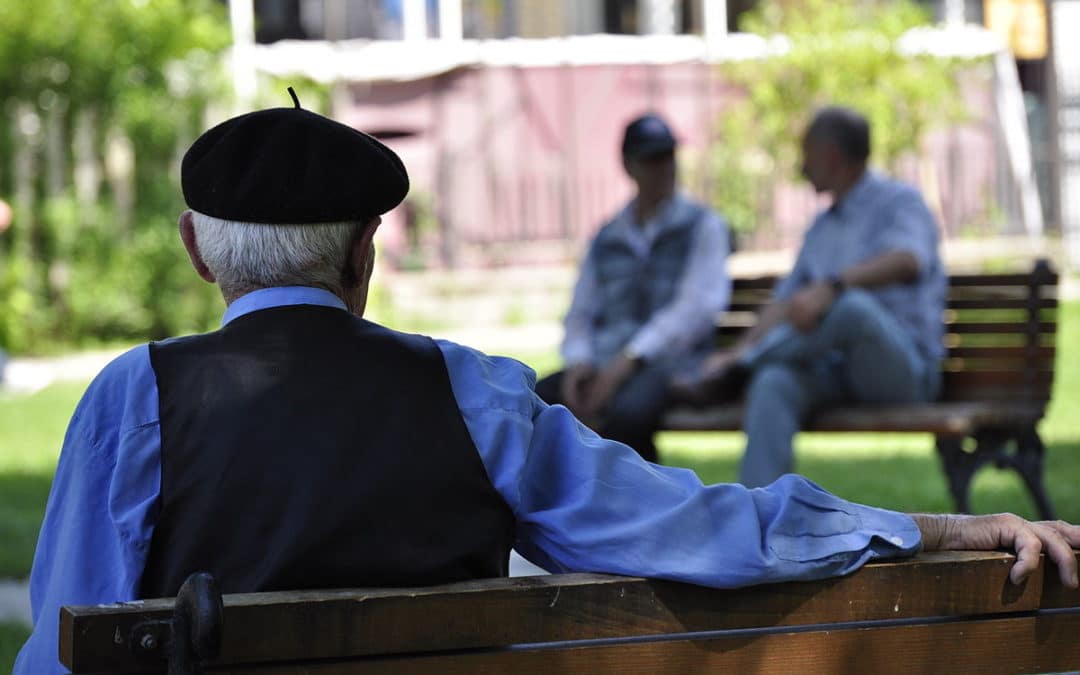Warning: Undefined array key 1 in /var/www/wp-content/plugins/monarch/monarch.php on line 4359
Feeling alone is one of the most miserable emotions to endure. Sadly, far too many people fall into the trap of loneliness.
As the years go by, things change, and we often become more susceptible to feeling alone in the world. The kids leave home, neighbors move away, friendships fade, beloved friends and family members pass on … And then the isolation sets in. However, once you realize what the problem is, you can start doing what you need to break free. Although change is never easy, there are some fairly simple steps you can take to feel happier and more connected.
First, it’s important to understand that feeling lonely isn’t a personal failing; it’s part of the human condition. Also, Science Daily reports social isolation has grown more prevalent in recent years. In other words, you’re not alone in feeling alone.
“Approximately 42.6 million adults over age 45 in the United States are estimated to be suffering from chronic loneliness, according to AARP’s Loneliness Study. In addition, the most recent U.S. census data shows more than a quarter of the population lives alone, more than half of the population is unmarried and, since the previous census, marriage rates and the number of children per household have declined.”<
Second, we’ll take a look at the definition of “lonely.” Seeing words that describe how we feel can help us put things in perspective. And third, we’ll discuss the different types of loneliness and what you can do to address them.
Lonely: Definition (Does this Sound Like You?)
We’ve all been lonely at one time or another and we all know what it is like to feel alone. But just what exactly is the actual definition of loneliness? According to Dictionary.Com, we define this condition in several ways:
- affected with, characterized by, or causing a depressing feeling of being alone; lonesome.
- destitute of sympathetic or friendly companionship, intercourse, support, etc.:
a lonely exile.
- lone; solitary; without company; companionless.
- remote from places of human habitation; desolate; unfrequented; bleak:
a lonely road.
- standing apart; isolated
We should also note here, that “lonely” is not the same thing as “alone.” Some people crave solitude and are perfectly happy without much contact with others. If that sounds like you, don’t let your loved ones pressure you into socializing more than you want. But also take care to check in with yourself and make sure your solitude doesn’t slip into feeling isolated.
RT @HarvardHealth: The epidemic & health dangers of loneliness https://t.co/SERdz0TuBR #HarvardHealth #aging #health pic.twitter.com/AzV3PEYuU2
— Perfect Sleep Chair (@SleepChair) December 11, 2017
Why Do I Feel So Alone?
Figuring out why you feel so alone is the first step towards breaking free from the dreaded loneliness trap. Once you know what type of aloneness you’re battling, you can begin to form a plan with steps to help you feel better. While you can’t fix things just by recognizing the problem, knowing what you’re up against can help you take charge. For example, if you miss having a romantic partner, you may want to consider online dating. On the other hand, if the quiet house in the evening hours is part of why you feel so alone, maybe you could advertise for a roommate. Let’s take a look at the seven most common types of loneliness.
Types of loneliness
Although we all recognize what it is to feel lonely, not all loneliness is the same. According to psychologists, there are actually seven different types of loneliness that are commonly experienced by people of all ages.
-
-
- New-situation loneliness: This feeling is experienced when you find yourself in a new situation where you have yet to make friends and build a support system. The cure for this is getting out and about in your community.
-
- I’m-different loneliness: This happens when you have people around you, but you feel like you are different for everyone else and just don’t fit in with the rest of the crowd. If this sounds like what you’re feeling, see #5 from our list below.
-
- No partner loneliness: This feeling takes over when you have friends and family, but you are longing for the special feeling that only comes from a romantic relationship.
-
- No animal loneliness: Some people just don’t feel complete without a pet of some sort to share their life with, such as a dog or a cat. If so, keep reading, because getting a pet is easier than you think.
-
- No-time-for-me loneliness: This type of loneliness occurs when your friends and family are so busy with their own lives that they just don’t seem to have time for you.
-
- Untrustworthy-friends loneliness: Simply having friends doesn’t mean that you won’t be lonely. If you don’t feel like you can actually trust your friends, you can still find yourself feeling very alone.
-
- Quiet-presence loneliness: This happens when you have active relationships outside of your home, but you still miss having the quiet presence at home of a spouse or roommate.
-
Do any of the above fit the kind of lonesomeness you’re experiencing? If so, read on for some helpful suggestions.
?Although the holidays make loneliness feel worse, there are ways to fight it on a daily basis. #AlwaysKeepFighting because #YouAreNotAlone. ❤️2You.
Merry Christmas.? pic.twitter.com/B44ScLLWU7— Angela Marshall (@hugsandsnugs67) December 25, 2017
5 Ways to Stop Feeling Lonely
Regardless of why you feel lonely, there are ways you can actually fight back against this dreadful feeling. When we feel alone, we often make things worse by waiting for others to come rescue us. In many cases, we’re ashamed of these feelings and don’t reach out, which creates a vicious cycle. Instead, we need to get out into the world and actually seek out meaningful relationships. You may have to step out of your comfort zone initially, but in the end, it will be worth it. As we mentioned before, the first step in the process of fighting loneliness is to figure out what is missing from your life. From there, you can work on filling that void and finding happiness again.
1. Reach out to friends and family
Reaching out to friends and family can help you to not feel alone. Don’t sit back and wait for them to come to you. This is a common error that lonely people make all too often. Pick up the phone and let them know that you miss them. And don’t be vague. Suggest a specific activity, place, and time you think would work for them. Invite them out to lunch, to your home for a cup of coffee, or out for a walk. Keep in mind that people do lead busy lives these days and try to meet them halfway. For example, if their kid’s into sports and they’re constantly driving her around, offer to come along. Try not to take it too personally if their schedules get in the way, as this is an easy mistake to make when you are feeling lonely. But do reach out to let them know that you care about them and miss their company. Even a brief phone conversation may make you feel better … And if you invite enough people enough times, someone’s bound to say yes.
2. Get involved in a hobby, class, or activity
When you feel lonely and are trying to make new friends, a great way to take matters into your own hands is to take up a new hobby or join a new activity. When we are younger, friends come easy because we are surrounded by classmates at school and on the playground. Meanwhile, those of us who’ve raised children often become friends with other parents through our kids’ classes and activities. As we get older, the opportunities to make new friends become increasingly rare.
So, take matters into your own hands and find a place to meet new people. Start with something you’ve always wanted to do and will enjoy for the sake of just doing it. Take a pottery class, join a club, anything to get yourself out among other people. This gets you out of the house, and you may make some friends in the process. Just interacting with other people while you are participating can help you feel less alone. Good places to start are your local YMCA, library, community college, and community center.
3. Volunteer in your community.
Your loneliness can become overwhelming. It is easy to let this feeling slowly overtake you as you sink into depression. One thing that can help is to take your focus off of yourself and think about others instead. Volunteer in your community. Read to children at the library. Serve meals at the local homeless shelter. See if your local animal shelter needs help. Find a local campaign, initiative, or cause you can get behind. Anything to help your community or people in need and not think about yourself for a little while. As a bonus, getting involved often leads to new friendships over time. For ideas, start with our post on 10 Ways to Give back to Your Community.
4. Get a pet.
Although it may sound like a cliche, getting a pet can help you stop feeling lonely. Adopting a dog, cat, or other furry, feathered, or scaled friend can help you to connect with another living being. This, in turn, makes you not feel so alone in the world. Dogs and cats can welcome you home from a long day at work, they can snuggle next to you as you sleep, and they never blab when you tell them your deepest, darkest secrets. In addition, having something that you know depends on you can also help relieve loneliness and depression.
Dogs are especially good for getting you out of the house and among other humans. They help break the ice, and you never know who you’ll meet while taking Fido for a walk or to play at the park.
And if you think getting a pet is too expensive, think again. The adoption fees at local animal shelters and rescues are very reasonable and also often include vaccines, microchipping, spaying, and neutering. There are also nonprofits that provide pet food, medications, and other forms of assistance to low-income pet owners. The Humane Society has a list of groups by state here. Your local animal shelter may also know of more options.
What if you’re not allowed to have pets?
But what if your lease or homeowners association docs say “no pets?” It turns out that may not apply to smaller animals or ones that don’t cause allergies or bark while you’re not home. For example, guinea pigs and zebra finches are delightful and live in an enclosed area. Cats are also quiet, and the Powers that Be may be amenable to a female who’s been spayed. There are also small dog breeds that don’t cause allergies and that are easy to take with you to a lot of places. You also may be able to get around the “no pets” rule by handing over a pet deposit. To find potential pets, start with PetFinder.Com. There, you can search by zip code, type of pet, breed, age, gender, and more.
5. Put yourself out there.
If you’re feeling lonely for lack of a romantic partner or people on your special wavelength, that’s a bit more of a challenge. Luckily, the Internet can save you a lot of time and fruitless social encounters by helping you pre-select for compatibility. Meetup.Com‘s a great resource for finding groups of people near you who share common interests. Although you sign up for groups and get notified of events online, the actual meetups take place in the real world. It’s free and easy to sign up, create a profile with your interests, find local groups, and join them. Community Colleges are also great places to take inexpensive classes that interest you.
And if you’re looking for that special someone, try online dating. It’s not just for millennials wanting to hook up anymore. Why kiss dozens of frogs to find that prince or princess when you can at least start out in the right pond. With online dating, you create a profile that clearly describes your interests, relationship goals, and personality. You then get matched up with people who are more likely to be compatible.
Two great sites for mature singles are Zoosk and OurTime. Zoosk is among the biggest sites with an easy-to-use design, a friendly community, and lots of matches to choose from. OurTime is created specifically for “mature daters” looking for serious partners … And there’s plenty of handholding for the technologically timid. Both sites offer free entry-level memberships so you can test the waters. If you feel it’s for you, you can upgrade to a paid membership. If you’re short on cash, lots of people have found love on OK Cupid, a top free dating site.
6. Tend to your spiritual needs.
Whether or not we practice any religion, we all have spiritual needs. Contemplating the spiritual connects us to something bigger than ourselves and makes us feel as though we’re part of a higher purpose. For some, solitary activities like walking in nature, meditating, reading inspirational texts, and yoga can meet these needs. Many towns and cities offer morning Tai Chi classes in a public park. Others who grew up in a particular faith may want to reconnect through a house of worship.
If there’s no house of worship for your faith nearby, try a Unitarian church. The Unitarian Universalists see all faiths as worshipping the same God and include a variety of faiths, traditions, and spiritual practices in their services.
And if you’re an atheist or agnostic, that doesn’t mean you have to feed your spiritual side alone. Unitarian churches welcome non-theists as they are, without trying to convert them. And, believe it or not, a lot of cities these days have atheist churches with actual Sunday services. If you want a spiritual community without being having to believe things you don’t believe in, visit the Holy Koolaid site. They’ll help you find an atheist/agnostic group near you.
Fight back against feeling alone
Loneliness is a horrible feeling. It can lead to anxiety and depression, casting a dark cloud over your golden years. But recognizing that you feel lonely and identifying why you feel alone can get you on the path to breaking free of the loneliness trap. We may not have control over everything in our lives, but we have more control over how alone we feel than most people realize. With a little determination and a positive attitude, you can find a way to feel less lonely and lead a happier life.
Watch Baya Voce’s TedX talk on loneliness.
Featured image via Wikimedia Commons
I’m a self-professed madman, adventurer, photographer, certified High-Performance Coach, martial artist, and licensed physical trainer specializing in senior fitness. My passion is to continue growing and developing into my own unique, gifted, and joyful authenticity, while committing myself towards doing my own special part to help change the world. My mission is to help others find their own direction and purpose in life, by means of mentoring, teaching, and empowering.






